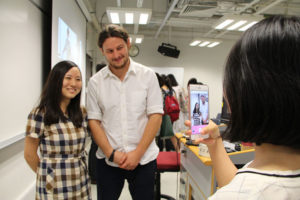by April Zhou
photos by Jane Yao
Instead of reporting how Ebola affected the West, like most mainstream media, Ben C. Solomon said his reporting team focused coverage on Liberians.

Student Zheng Zhuo asks to have her photo taken with Ben Solomon.
“People who are in the most terrible circumstances actually have the most powerful moments of hope. I think by showing those moments, by showing this kind of strength, we can see the hope that we can make a change,” said Solomon, one of the first foreign multimedia correspondents for The New York Times and who won the Pulitzer Prize for reporting on Ebola in West Africa.
“We were meeting different people, we were experiencing lots of things they did,” Solomon said.
The story was difficult to tell, difficult to follow and difficult for people to watch. Solomon said they encountered physical and mental risks.
“When you do videos like these, you want them to connect, you want people to be able to feel,” Solomon said, adding that the film was to build a bridge between communities.

